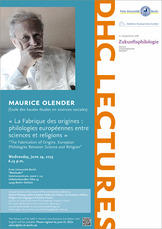DHC Lecture mit Maurice Olender (École des hautes études en sciences sociales)
La Fabrique des origines : philologies européennes entre sciences et religions
The Fabrication of Origins. European Philologies Between Science and Religion
Biographie:
Historien, Maurice Olender est archéologue et philologue de formation. Professeur à l’Ecole des hautes études en sciences sociales à Paris, il a été invité notamment aux USA (Princeton, Johns Hopkins, Harvard, Columbia), en Italie, en Israël, à l’Académie des sciences sociales de Pékin. Editeur, Maurice Olender dirige, depuis sa création en 1981, la revue Le Genre humain. Après avoir créé « Textes du XXème siècle » chez Hachette », en 1985, il a fondé au Seuil «La librairie du XXème » puis « du XXIème siècle » en 1989.
Ses recherches, historiques et anthropologiques, portent sur les manières de penser et de formuler l’originaire (notamment sexuel, religieux, linguistique, racial) dans les savoirs mythiques et scientifiques, anciens et modernes.
Parmi ses publications :Les Langues du Paradis, préface de Jean-Pierre Vernant («Points essais», 2002), couronné par l’Académie française, traduit en une quinzaine de langues (allemand : Die Sprachen des Paradieses. Revidierte Ausgabe, hg. und mit einem Vorwort von Markus Messling, Berlin : Kulturverlag Kadmos 2013 ; anglais : The languages of paradise, Cambridge et al. : Harvard University Press 1992) ; Race sans histoire (« Points Essais » 2009), Prix Roger Caillois, publié simultanément sous le titre Race and Erudition, Harvard University Press; Matériau du rêve, IMEC, «Le Lieu de l’archive», 2010.
ENGLISH:
The ancient appropriation of Hebrew by the Church Fathers was followed, in 19th century Europe, by an erudite readiness to construct new forms of discourse based on Sanskrit, in order to suggest new Aryan origins to the Western Tradition. In a world governed by Romanticist visions and driven by colonial aspirations, between a Christianity weakened by the Enlightenment and the propagation of a scientistic secularism, certain learned fables of an Indian origin succeeded in replacing the Hebrew ones as a figure of heritage. In this fabrication of origins, the new “Aryan Bible” called for a new language of Paradise: Sanskrit.
The methodologies of “comparative philology,” long serving as a synonym for “language sciences,” could bear the mark of raciologic knowledge that had, often until the 1940s, guided both the Humanities and the natural sciences.
Biography:
Maurice Olender is Professor of history at the École des Hautes Études en Sciences Sociales (EHESS) in Paris, with a formation in archaeology and philology. He has lectured at different European and U.S. American universities (Princeton, Johns Hopkins, Harvard, Columbia), in Israel and at the Chinese Academy for Social Sciences in Beijing. Since 1981 he has been the chief editor of the journal Le Genre humain; in 1985 he founded the series Textes du XXème siècle (‘texts of the 20th century’) with Hachette; in 1989 he launched the series La librairie du XXIème siècle (‘library of the 21st century’) with the Seuil publishing house.
His historical and anthropological research is concerned with figures of thought and discourses regarding sexual, religious, linguistic and ethnic origins in mythological and scientific systems of knowledge since Antiquity.
Publications (selection): Les Langues du Paradis, with an introduction by Jean-Pierre Vernant, Paris: Seuil 2002 (Points essais), awarded by the Académie française, and translated into several languages (German: Die Sprachen des Paradieses, revised edition, edited with an introduction by Markus Messling. Berlin: Kadmos 2013; English: The Languages of Paradise, Cambridge, MA: Harvard UP 1992); Race sans histoire, Paris: Seuil 2009 (Points Essais), awarded the Prix Roger Caillois for essay writing, published simultaneously as Race and Erudition with Harvard UP; Matériau du rêve, IMEC 2010 (Le Lieu de l’archive).
Der Abendvortrag fand im Rahmen der Konferenz Semitic Philology within European Intellectual History. Constructions of Race, Religion and Language in Scholarly Practice, 20.-21. Juni 2013, Forum Transregionale Studien statt.
Das Konferenzprogramm steht Ihnen hier zum Download zu Verfügung.
In Zusammenarbeit mit:
 |
 |

